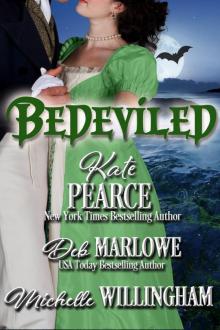- Home
- Kate Pearce
The Duke of Debt
The Duke of Debt Read online
THE DUKE OF DEBT
Kate Pearce
Millcastle Series #3
Table of Contents
Introduction
Note to Readers
Chapter 1
Chapter 2
Chapter 3
Chapter 4
Chapter 5
Chapter 6
Chapter 7
Chapter 8
Chapter 9
Chapter 10
Chapter 11
Chapter 12
Chapter 13
Chapter 14
Chapter 15
Chapter 16
Chapter 17
Chapter 18
Chapter 19
Chapter 20
Excerpt – The Lord of Lost Causes
About Kate
Other Books by Kate
Copyright Page
Introduction
When Alistair Haralson unexpectedly inherits a dukedom, he is determined to restore it to its former glory. After being deprived of control of his family fortune by his father’s second wife his prospects are bleak until Miss Margaret Blackthorn makes him an intriguing offer—her industrially acquired fortune in return for a marriage of convenience. Can Alistair afford to ignore her invitation? And, will they both get far more than they bargained for as they work together to survive their enemies and find unexpected happiness?
Note to Readers
Dear Readers,
I hope you enjoy book 3 in the Millcastle series, which features Margaret Blackthorn, Adam’s forthright sister, and Alistair Haralson a distant relative of Captain Grafton. When an industrially acquired fortune meets a bankrupt dukedom, what could possibly go wrong?
Enjoy, and don’t forget to check out The Lord of Lost Causes and Master Of None if you haven’t done so already, and please feel free to join my newsletter for the most up to date information about what is coming out next.
Best
Kate Pearce
Chapter 1
Millcastle 1833
“Will you come with me, Francis?” Alistair Haralson, Marquess of Hellion repeated his question. “I can’t deal with that side of the family on my own.”
“I agree that they are difficult, but why do you need me?” Francis Grafton, Viscount Wesley—who was known locally as Captain Grafton—shifted restlessly in his chair. “Caroline is with child, and I’m unwilling to leave her at this point in time.”
They were sitting in Francis’s library at his country estate just outside the rapidly expanding industrial town of Millcastle. Despite being a viscount, Francis had considerable business interests in the town and derived most of his income from trade. He and Alistair, who were distantly related, had attended school together before both joining the army, where Francis had ended up being dishonorably discharged, and Alistair had ended up in India.
“Ah, I didn’t realize.” Alistair paused. “Of course your priority must lie with her. Congratulations, by the way.”
“Thank you. Why has the old man called you up here again?” Francis offered Alistair a cigarillo. “Didn’t you pay your duty visit two months ago?”
“The invitation wasn’t from him. I received a frantic scribbled note from Lilly saying that everything is not as it seems, and that if I wish to safeguard my inheritance, I should return immediately!” He grimaced and lit the cigarillo. “Not that I have any hopes of actually attaining anything, seeing as my cousin Farrell is alive and kicking.”
“Farrell is an obnoxious drunkard,” Francis observed.
“As were his father and grandfather.” Alistair blew out a perfect circle of smoke. “One might say he is simply following family tradition.”
“Since his father died, he’s been running wild, and your mutual grandfather does nothing to curtail his extravagances.”
“I suspect the old boy is rather proud of him,” Alistair replied. “Do you think I should go, or wait for a more official summons?”
“I’d go.” Francis finished his cigarillo. “Your cousin Lilly does know all the best family scandal, and if she is trying to warn you, I’d pay attention.”
“You’re right,” Alistair agreed. “Farrell is probably in debt again and expects me to help him out, which is impossible. My finances are precarious enough as it is.”
“And you a marquess,” Francis gently mocked him.
“Of nothing, as you well know.” Alistair mock-frowned at his favorite relative. “My father tied up what money there was tighter than a duck’s arse, and his new wife took the rest.”
“He never really trusted you, did he?” Francis said idly.
“No.” Alistair smiled sweetly at his friend. It was not a subject he ever discussed, and he wasn’t about to start now. “Which means that my stepmother and my sister live very comfortably at my expense in the only habitable property I ostensibly own.”
“You don’t begrudge them that, do you?”
“Not at all.” Alistair stubbed out his cigarillo with unnecessary force. “It means they don’t bother me, and as you know, I do value my privacy.”
In truth, he’d rather have a decent income, but, as a gentleman, he was hardly allowed to say that. He simply watched the money from his late father’s estate flow toward his stepmother, leaving him with a small income from his grandmother’s trust and the surplus revenue from the estate. Frederica, his stepmother, was the same age as him and had very skillfully exacerbated the distance between father and heir. She’d also prevented Alistair from seeing the old devil when he was dying and had rewritten the will very much in her favor.
Alistair had never told her how he felt about that—he wouldn’t give her the satisfaction—and was exquisitely polite to her on every occasion when they were forced to breathe the same air.
“I’ll talk to Caroline. She might be relieved to see the back of me for a while, as apparently I ‘fuss’.” Francis opened one of the windows to encourage the smoke to leave. “Whatever happens, I can’t go quite yet. We’re hosting a party this weekend starting with a dinner tonight.”
Alistair fought a smile. His cousin’s distaste for the niceties of polite society was no secret. The fact that he was concerned enough about his wife to be called fussy was actually quite amusing.
“What’s the occasion?” Alistair asked.
“It’s Caroline’s sister’s birthday.”
“Which sister?”
“Ruby. The one who fervently believes that aristocrats like you and I should be guillotined.” Francis smiled as he moved restlessly around the room. “She’s intent on marrying a man I employ as my bookkeeper.”
“You married your bookkeeper,” Alistair noted.
“Indeed.” Francis added more coal to the fire. “Perhaps it will become a family tradition. It isn’t a large party, thank God, just Caroline’s family and the Blackthorns.”
“I remember a very fierce lady at your wedding called Blackthorn,” Alistair said. “Now, what was her name?”
“I expect you’re referring to Miss Margaret Blackthorn, Adam’s eldest sister.” Francis checked the time. “She is almost as formidable as Ruby.”
“Indeed,” Alistair murmured. It was rare that someone took an instant dislike to him, but Margaret Blackthorn certainly had. She’d sized him up in one contemptuous glance, and he’d been instantly relegated to simpering fop. He’d even gone out of his way to solicit a dance with her, and, despite his best efforts to be charming, had failed to impress her at all.
It was a novel sensation, because he might not be rich, but he was titled and handsome, which worked wonders with most ladies. If she was present at the party, he was tempted to stay just to see her expression when he was announced at the dinner table.
He rose to his feet and bowed to his companion.
“If I am to stay for dinner, I’d better speak to my valet and make sure I look presentable.”
“You are already a veritable fashion plate compared to me, but I’m glad you’ve decided to stay.” Francis nodded at him. “I’ll speak to Caroline. If she is agreeable, we can leave on Monday.”
Margaret Blackthorn put on her new evening dress and made sure the skirts were neatly arranged over her bulky petticoats. Sometimes she wondered how she allowed herself to be dictated to by a fashion that constricted her movements so greatly. When she’d lived in the millhouse at Ravenhead with Adam and her sister, Lottie, she’d barely bothered to wear more than one petticoat. But then she’d been doing all the cooking, cleaning, and washing, while still trying to keep up appearances, and too many petticoats would’ve gotten in the way.
Margaret found a necklace of amber in her jewelry box and clasped it around her neck. Now she never had to do anything for herself or her family except be a lady. She sighed. Sometimes she felt so useless…
A tap on the door had her turning around and arranging a smile on her face.
“Are you ready, Margaret?” Her sister, Lottie, who looked effortlessly beautiful in her favorite primrose yellow, came in through the door. “Oh, my goodness! You cannot leave your hair in such a severe style! Let me arrange it for you.”
Margaret sat down and allowed Lottie to fuss over her a little. Her sister had settled far better than Margaret had into the life of leisurely luxury their brother now provided for them. Despite having had to work hard, Margaret was secretly proud to have supported her family on a meager budget.
There was no need for such economy now. In the last year, Adam had opened his third mill and had rapidly become the wealthiest man in Millcastle. Margaret and Lottie had generous dowries at their disposal and the opportunity to marry whoever they wanted. Because of her beauty, Lottie attracted a lot of attention, but even Margaret had received three offers of marriage in the past year. She hadn’t accepted any of them.
“There.” Lottie placed some flowers in Margaret’s hair and beamed at her. “You look beautiful.”
Margaret knew that wasn’t true, but she did look her best, even if they were only going to celebrate Ruby Delisle’s birthday at Captain Grafton’s country estate. She found her gloves and her reticule, and followed Lottie down the stairs into the drawing room where Mrs. Marsham awaited them. The widow wore her usual black garb and the apprehensive expression of a woman who preferred the comforts of her own home to socializing.
Her expression improved when she spied Lottie.
“You look beautiful, my dear.”
Lottie rushed over and pecked Mrs. Marsham on the cheek. “So do you, ma’am, and doesn’t Margaret look lovely?”
“Indeed she does.” Mrs. Marsham nodded, the dainty black lace of her cap taking flight in the draft. “Most handsome.”
Lottie glanced back toward the door. “Is Adam ready to leave? Shall I go and find him and Emily?”
“They were visiting the nursery to say goodnight to my grandson and promised to be down in a moment.” Mrs. Marsham’s smile softened as she mentioned her daughter and only grandchild. “That child looks so like his father.”
“Let’s hope he has the same disposition,” Margaret said briskly. “He’ll be inheriting a manufacturing empire by the time he’s an adult.”
“Adam has done very well for himself,” Mrs. Marsham agreed. She picked up her fan and reticule, and brightened as her daughter came through the door.
“There you are, Emily!”
Emily looked her usual happy self, her fair hair piled high on her head in a cascade of ringlets. Margaret hadn’t taken to Emily when Adam had first married her but had come to not only respect her, but to like her, too. Despite her fragile appearance, Emily was a strong woman and was much loved by her husband.
“You look very nice, Margaret,” Adam commented.
“Thank you.” Margaret curtsied to her brother, who was immaculate in his black and white evening clothes.
He studied her gown. “I told Emily that weaving the lighter silks for the new fashion of dresses would be successful.”
“No, I told you that.” Emily came to slide her hand over her husband’s elbow. “Remember?”
“If you say so, my dear.” Adam winked at Margaret. “Whoever thought of it has made me a lot of money, I can tell you that.”
Margaret made sure that everyone remembered their shawls, reticules, and cloaks and followed them out to the carriage. It was already dark, and a slight breeze rippled through the trees, making them all hurry to get settled in.
It didn’t take that long to reach the Grafton estate, but they might as well have been visiting a different world. Gone were the red brick factory buildings and smoking chimneys, and in their place sat manicured gardens and high stone boundary walls to keep out unwanted visitors.
Margaret always felt slightly ill at ease at the manor house and refused to admit to herself that she was intimidated by its size and grandeur. If it was good enough for Captain Francis Grafton, it was good enough for her brother, Adam, who was now far richer than the viscount.
She entered the hall, ascended the stairs, and was relieved of her cloak and boots by a maid. She put on her soft kid slippers, made sure her hair was tidy, and went back down into the hallway. The sound of voices drifted from the open doorway of the drawing room, but the enormous fireplace, which was big enough to walk into, commanded her attention.
“It’s a relic.”
She spun around as a voice spoke from behind her and a blond-haired man appeared on the stairs.
“I beg your pardon?”
He continued his descent and came to stand beside her. “The fireplace was once the end wall of the great medieval hall before the rest of this house was built around it.”
“I am aware that the house is very old,” Margaret said stiffly.
He pointed toward the blackened interior of the structure. “You can still see the holes for the bread ovens at the back, and the metal of the spit. It must have been quite a sight.”
“Indeed.”
He bowed to her. “How good it is to see you again, Miss Blackthorn.”
Margaret raised an eyebrow. “You remember me?”
“How could I not?” His smile made her straighten her spine. “I’ve rarely met anyone who has taken me in such dislike so quickly.”
If he was expecting her to dissemble and blush at his direct attack, he was in for a surprise.
“Did I dislike you, sir? I wonder why? I wish I could remember your name, because I have quite forgotten it.”
He had the audacity to grin at her. “Well done, Miss Blackthorn. I am suitably put in my place.”
He offered her his arm. “Shall we go through and meet our fellow guests?”
Margaret placed her hand on his sleeve and allowed him to escort her into the drawing room. She had to admit that he’d taken her dismissal quite well. She’d been told that she lacked a sense of humor, but even she could see the amusement lurking in his blue eyes. Now she just had to decide whether he was laughing at her, or with her.
Ruby rushed over to greet them. She wore a red dress with brown lace and looked her usual enthusiastic self. “Margaret! I am so glad that you could come!”
“Happy birthday.” Margaret smiled at her friend, aware that her companion still lingered at her side. “Have you been introduced to—”
“As the Marquess of Hellion has been staying with Francis and Caroline for the past few days, I am well acquainted with him,” Ruby said. “We have had some very stimulating discussions over dinner.”
“Stimulating in that you annihilate my every position and leave me for dead,” the marquess murmured. “I thank the Lord daily that the general populace aren’t allowed to vote, because if you were in power, Miss Ruby, I suspect I would be facing certain death.”
“I have no time for the landed aristocracy,” Ruby declared.
“Even your own brother-in-law?”
Margaret asked.
“Oh, Francis isn’t one of them.” Ruby waved a dismissive hand in the direction of her brother-in-law. “He’s another thing entirely.”
“I’d have to agree with you there,” Lord Hellion said. “He certainly is unique.”
The butler came past, and Lord Hellion procured two glasses from the tray and offered one to Margaret.
“My lady?”
“Thank you.” She accepted the drink. “I can’t imagine anyone getting the better of you in an argument, my lord. But as I’m part of the general populace, I’ll offer my support for Ruby’s views.”
“That’s the spirit.” He clinked his glass against hers and Ruby’s. “Down with the aristocracy, and vive la France.”
Ruby was still laughing as she turned away to greet Adam, leaving Margaret alone with the marquess, which was not at all where she wished to be. He might appear to be indolent, but she was rapidly beginning to realize that his gaze was remarkably sharp.
“Where did you meet Captain Grafton?” She attempted to be civil.
“At school, where we found out we were distantly related to each other, and then we went into the army together.” His smile was absent now. “We ended up in India where we lost touch for several years.”
“You were in the army?”
“Indeed.” It was his turn to raise an eyebrow. “Why does that surprise you?”
“Because—” Belatedly, Margaret remembered her manners. “I thought heirs to a title weren’t encouraged to join up.”
“That is true—unless their fathers didn’t care about such niceties, but that wasn’t what you were going to say, was it?” He stared down at her, a question in his eyes. “Do I not look capable of defending my country?”
“I would never say that, my lord.” Margaret held his stare. “It’s just that you are… so handsome.”
He frowned. “What does that have to do with my ability to fight? Do you think I am too pretty to wield a sword?”
“I meant that you look completely unscathed.” Margaret wasn’t used to being put on the back foot by anyone, let alone an idle aristocrat.
“Ah. That.” He drank his wine in one swallow and bowed to her. “Not all scars are visible Miss Blackthorn.”

 A Ghost of a Chance
A Ghost of a Chance The Maverick Cowboy
The Maverick Cowboy And a Pigeon in a Pear Tree
And a Pigeon in a Pear Tree The Rancher Meets His Match
The Rancher Meets His Match A Christmas Brothel: A Set of Canterbury Christmas Tales
A Christmas Brothel: A Set of Canterbury Christmas Tales The Cowboy Lassoes a Bride
The Cowboy Lassoes a Bride The Second Chance Rancher
The Second Chance Rancher Sweet Talking Rancher
Sweet Talking Rancher The Last Good Cowboy
The Last Good Cowboy The Rancher's Redemption (The Millers of Morgan Valley Book 2)
The Rancher's Redemption (The Millers of Morgan Valley Book 2) The Billionaire Bull Rider
The Billionaire Bull Rider The Duke of Debt
The Duke of Debt Death Bringer sj-2
Death Bringer sj-2 Bedeviled
Bedeviled Tempted at Christmas
Tempted at Christmas The Lord of Lost Causes
The Lord of Lost Causes Vikings Unleashed: 9 modern Viking erotic romances
Vikings Unleashed: 9 modern Viking erotic romances